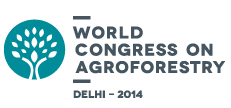
Vigyan Bhavan & Kempinski Ambience
10 - 14 February 2014
Delhi, India
blog
Development agencies and researchers have long assumed that rural women are victims. Not only of climate change but also nearly everything else. New research says these assumptions are without basis.
According to Bimbika Basnett, a researcher with the Center for International Forestry Research (CIFOR), the premise that women are victims of climate change rests on tenuous assumptions and weak empirical evidence. What’s more, there is a tendency amongst people researching gender and agroforestry to tabulate data that has been separated into male and female data and draw far-reaching conclusions from it.
“In a way, it’s welcome that women are being discussed in the climate-change area,” she said. “But when you look at the assumptions that the discussions are based on, they are wrong. They can lead to negative outcomes.”
The general argument is that poor and disadvantaged people are more vulnerable to climate change. Women are lumped into the category without question. However, men might be poor and vulnerable, too, and distinctions between the genders might be hard to correlate with vulnerability to climate change.
Yet in climate-change debates, the idea of women as victims is used to introduce wider issues of inequality. And because women are supposedly victims they can be mobilized to affect change. Basnett questioned where ideas like this came from and what sort of influence they had.
Recent research showed that there were two oft-repeated claims circulating in the sector: 1) Women are 70% of the poor; and 2) they are 14 times more likely than men to die in natural disasters.
There is no basis for either of these claims, says Basnett. ‘Data in developing countries is hard to get and of poor quality so how can someone reliably calculate the global percentage of poverty by gender? Second, there is no clear definition, anywhere, of what exactly is meant by “poverty”. Being poor in one country is different from being poor in another.
“Gender and poverty are usually separate issues in most countries and not exclusively the province of the rural poor. For example, in urban areas gender issues can be magnified, such as here in India, where female sex-selective abortion is more common in cities among wealthier people than in the countryside among the poor.”
Basnett also traced the source of the claim that women were 14 times more likely to die in a natural disaster. It was first aired as an anecdote in a workshop on natural hazards in 1994 and repeated without question thereafter for another decade.
Both these assumptions persisted even though they were wrong and no one had seen the original data.
“I think the uncritical acceptance of these statements, and the unquestioned “women are victims of climate change” argument, has been driven by the motivation to ensure that women and unequal power relations are included in policy discussions about climate change,” she said.
“People use this position to seek sympathy and strategic coalitions with those who privilege investing in women as a form of smart economics.”
This kind of thinking has negative effects, such as limiting the understanding of gender to stereotypes of women and men. It also weakens the credibility of gender research and encourages the implementation of policies that reproduce gender inequalities.
Basnett’s advice, not surprisingly, is that facts and figures should be investigated and not assumed. Second, there should be sound gender analyses conducted and, third, the approach used should be rights-based rather than instrumental.
Perhaps then women will be afforded the respect they deserve.
By Robert Finlayson
—
Related story
Gender is a many-splendoured thing
—
Follow the Congress on Twitter #WCA2014 for live updates!







2 People have left comments on this post
Eye opener!
Very enlightening facts.